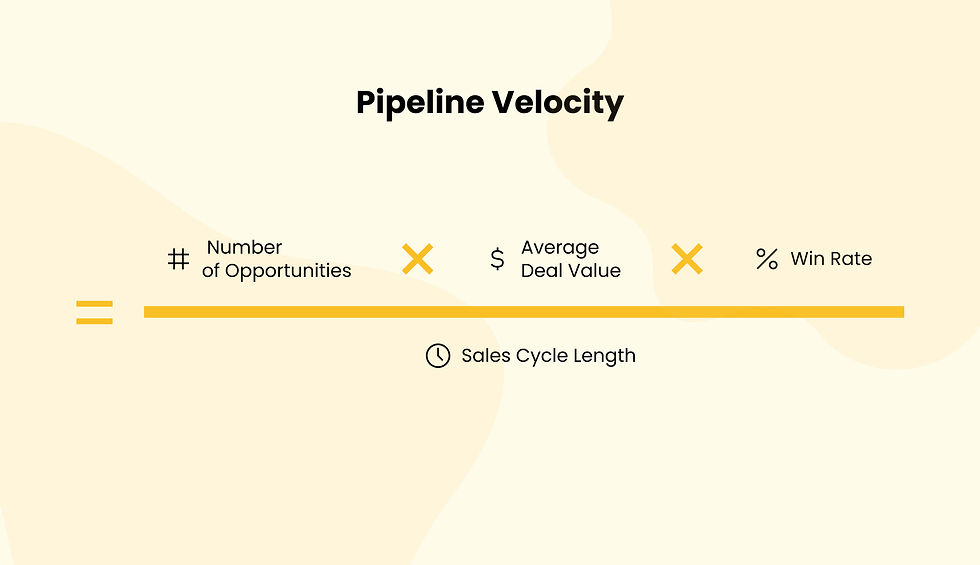Case Study: Doubling Pipeline Velocity with an AI-Driven Sales Tech Stack
- Steven Schaerer
- Jun 17, 2025
- 3 min read
Updated: Aug 3, 2025
In just six months, our technology client transformed their outbound sales process by integrating AI-powered tools across their sales stack. The result? Pipeline velocity doubled—and reps saw a dramatic shift in how they spend their time. Here’s how automating repetitive tasks unlocked capacity, accelerated deal cycles, and drove a 100% boost in lead conversions.

The Challenge: Manual Tasks Crushing Rep Productivity (72% Non-Selling Time)
Sales reps typically spend only about 28% of their week on true selling activities—meaning 72% is consumed by administrative duties:
CRM Hygiene Overhead (43% of Admin Work): Nearly half of reps’ admin time is spent on manual data entry and cleaning.
Lengthy Task Completion (>90% of Tasks Take Hours+): Updating records and generating reports can take hours—or even days.
Low Conversion Focus (14 Hrs/Wk Selling): With only 14 hours a week dedicated to outreach, reps simply can’t engage enough opportunities.
Our client recognized these bottlenecks were capping pipeline growth and sought an AI-driven solution.
Building the AI-Driven Sales Tech Stack (5 AI Tools Deployed)
Salez Vision layered five complementary AI tools into our client's existing CRM platform, ensuring seamless data flow and an average 41% time savings per rep:
AI-Powered CRM Hygiene
Auto-log calls, emails, and notes—eliminating 43% of manual entry.
Automated Cadence Engine
Multi-channel sequences that adapt timing based on engagement, boosting reply rates by 25%.
Conversation Intelligence
Real-time call transcription and keyword spotting, improving coaching uptake by 15%.
Predictive Lead Scoring
Ranks opportunities by win probability, increasing high-value outreach by 30%.
Workflow Automation
Triggers follow-ups and tasks automatically, reducing missed actions by 50%.
Deployment took 8 weeks—2 weeks for baseline measurement, 4 weeks for platform integration, and 2 weeks for automated campaign activation—followed by continuous optimization.
Results: Metrics That Matter (7 KPI Improvements)
Metric | Before AI | After 6 Months AI | Improvement |
Rep time reclaimed (hrs/week) | 15 | 30 | +50% |
Task completion (CRM & reporting) | Hours–Days | Minutes | >90% faster |
Lead conversion rate | 20% | 40% | +100% |
Sales cycle length | 6 months | 3 months | –50% |
Active selling time per rep (hrs) | 15 | 30 | +100% |
Deals per rep per month | 2 | 5 | +150% |
Pipeline opportunities progressed/mo | 25 | 50 | +100% |
Time Recovery: Reps reclaimed nearly 15 hours each week by offloading data entry.
Speed & Accuracy: What once took hours now wraps up in minutes.
Conversion Lift: Personalized, AI-tuned sequences drove a 100% jump in lead-to-opportunity rates.
Cycle Compression: Complex deals closed up to 100% faster, turning a 6 month process process into a three-month sprint.
Research Highlights: Quantitative Impact of AI on Sales Productivity
To wrap up, our client's experience isn’t an outlier—independent research consistently demonstrates that AI-driven automation and insights deliver dramatic gains across the board. From reclaiming rep bandwidth to accelerating deal cycles and boosting conversion rates, the data makes a compelling case for embedding AI throughout your sales stack:
41% of sales reps report that AI automation of repetitive tasks freed up significant capacity for selling activities, according to Gartner.
Task times slashed by over 90% (from hours or days down to minutes) when core processes are embedded with AI, per Deloitte’s analysis.
Lead conversion rates climb up to 30% for companies integrating AI into their sales workflows, driving more opportunities through the funnel (Accenture).
Sales cycles accelerated by 30–50% in organizations that adopt AI-driven tools, dramatically shortening complex deal timelines (LinkedIn).
By systematically removing manual redundancies and focusing reps on high-value interactions, an AI-driven sales tech stack doesn’t just improve efficiency—it doubles the pace at which opportunities move through your pipeline. That kind of acceleration can be a game-changer for revenue growth in 2025 and beyond.



Comments